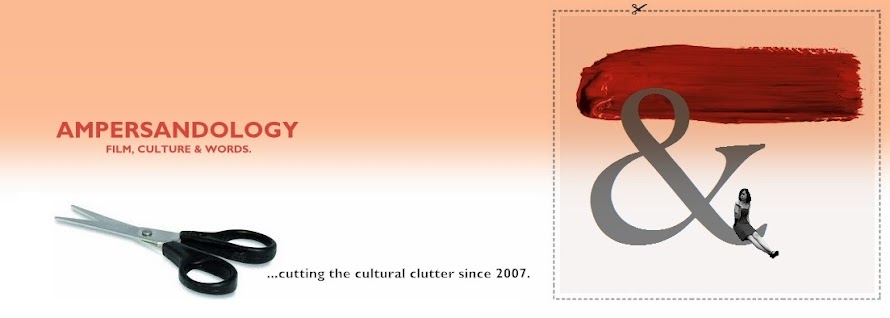by Jillian Butler, Ampersandology
I just finished the Esquire profile on film critic Roger Ebert and it must be said: this man is making me awestruck. Really, read it. If you've ever used an Ebert review to decide whether or not to shell out for the theater ticket, or given something "Two Thumbs Up!", or stayed up too late watching the old Siskel & Ebert Show, read it. Hell, if you've ever remotely heard of him, read it.
Along with Pauline Kael, Roger Ebert is my other favorite film critic, but they share the space for very different reasons. Kael has to be there -- she had an uncanny gift for diagnosing a film's precise place in cinematic history (as in her famous collection 5001 Nights at the Movies -- microscopic reviews that appeared in The New Yorker’s Goings On About Town section). She was also a real character and a powerful voice in the film industry: Robert Altman invited her to screen of Nashville months before it premiered in an effort to boost the box office draw and reassure the wary studio heads. It didn't work, but it didn't matter: Kael was the basis of film criticism as we know it, writing long, divisive examinations of films on their own merit, not just to drive sales.
But Ebert is a different kind of genius, more modest and perhaps more commercial. One thing I have always, always admired about Roger Ebert is his democratic approach to movie reviewing. Of course, he's been accused of being a populist because of this, because if you glance through his trademark star system you'll notice that cinephile-darling La Dolce Vita receives three stars alongside such illustrious summer fare as American Pie.
But that's the way Ebert rolls -- he evaluates the film not in the plateau of the film-making past-- he simply looks at what the film is trying to accomplish, and judges accordingly. La Dolce Vita was a bold take on the French New Wave slowly engulfing the industry in the 1960s; American Pie wanted to make teenagers laugh at gross sex humour. For their respective efforts, they both get three out of four stars. It's not that one is better or worse than the other; it's just that they had different intentions.
It's an incredibly fair way to judge films and it's a method I try (and often fail) to adopt. A generous majority of film critics are also film lovers, and thus tend to take every bad movie as an offense to the medium. But hey, you just take a deep breath: the Norbits of this world finance The Squid and the Whales. Circle of life. Ebert just figured out a long time ago that not every film wants to be a Schindler's List or a Citizen Kane -- nor should they.
So take a minute and read the Esquire profile -- he really is a visionary.
I just finished the Esquire profile on film critic Roger Ebert and it must be said: this man is making me awestruck. Really, read it. If you've ever used an Ebert review to decide whether or not to shell out for the theater ticket, or given something "Two Thumbs Up!", or stayed up too late watching the old Siskel & Ebert Show, read it. Hell, if you've ever remotely heard of him, read it.
Along with Pauline Kael, Roger Ebert is my other favorite film critic, but they share the space for very different reasons. Kael has to be there -- she had an uncanny gift for diagnosing a film's precise place in cinematic history (as in her famous collection 5001 Nights at the Movies -- microscopic reviews that appeared in The New Yorker’s Goings On About Town section). She was also a real character and a powerful voice in the film industry: Robert Altman invited her to screen of Nashville months before it premiered in an effort to boost the box office draw and reassure the wary studio heads. It didn't work, but it didn't matter: Kael was the basis of film criticism as we know it, writing long, divisive examinations of films on their own merit, not just to drive sales.
But Ebert is a different kind of genius, more modest and perhaps more commercial. One thing I have always, always admired about Roger Ebert is his democratic approach to movie reviewing. Of course, he's been accused of being a populist because of this, because if you glance through his trademark star system you'll notice that cinephile-darling La Dolce Vita receives three stars alongside such illustrious summer fare as American Pie.
But that's the way Ebert rolls -- he evaluates the film not in the plateau of the film-making past-- he simply looks at what the film is trying to accomplish, and judges accordingly. La Dolce Vita was a bold take on the French New Wave slowly engulfing the industry in the 1960s; American Pie wanted to make teenagers laugh at gross sex humour. For their respective efforts, they both get three out of four stars. It's not that one is better or worse than the other; it's just that they had different intentions.
It's an incredibly fair way to judge films and it's a method I try (and often fail) to adopt. A generous majority of film critics are also film lovers, and thus tend to take every bad movie as an offense to the medium. But hey, you just take a deep breath: the Norbits of this world finance The Squid and the Whales. Circle of life. Ebert just figured out a long time ago that not every film wants to be a Schindler's List or a Citizen Kane -- nor should they.
So take a minute and read the Esquire profile -- he really is a visionary.


No comments:
Post a Comment